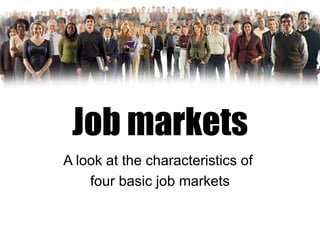Job Markets
- 1. Job markets A look at the characteristics of four basic job markets
- 2. Presenterâs perspective BSE, Civil Engineering, Princeton University (1985) Third-party recruiter since 1988 Engineers and manufacturing operations managers Experienced recessions of 1990-92 and 2000-02 George Corser Managing Director Aspen Search Group This presentation was prepared for the Engineering Society of Detroit, January 2009
- 3. Four basic job markets
- 4. Inclining market Occurs right after a bust People available shrinks Jobs available expands Employers are still cocky (from the bust market) but they canât find all the people they need Employers run risk of short-timer-ism if they offer lowball salaries
- 5. Boom market Few people, many jobs Employers have to make compromises in salary, skills and/or timeframe Job-seekers easily get interviews and often decline offers Job-seekers get cocky Employers may make exceptional offers, or positions go unfilled
- 6. Declining market Occurs right after a boom Jobs available shrinks People available expands Job seekers are still cocky (from the boom market), but employers donât have as many positions available Employees risk getting downsized, especially if they are overpaid (for the market)
- 7. Bust market Few jobs, many people Job seekers have to make compromises in salary, location/travel, management level Employers have more applicants than they can handle Employers get cocky Employees accept lowball offers, or remain unemployed
- 8. Clarifying your own market Knowing your own market : Certain specializations may remain hot even become hot, in a bust market When considering your particular situation you may determine the market for your specialization, not just the market overall Guilty by association : Even if you have a rare skill, you may be treated like other job seekers in the crowded market at first Employers may retain from prior markets concerns which arenât relevant in the current one
- 9. Summary of job markets Markets may suggest differing job-hunting tactics Nibble â ask for extras only after the offer is extended Set terms â get what you want or walk Offer Soft pedal â there is a lot of competition so be flexible Hardball â you may be the only candidate Interview Be specific â NO is better than MAYBE; you need every YES Be vague â everyone gets an interview Resume Bust market recommendations Boom market possibilities Hiring stage
- 10. To be continuedâĶ For the full presentation, contact George Corser at [email_address] Send LinkedIn invitations to [email_address] . This is just a part of a presentation that will be delivered at the end of January 2009 at the Engineering Society of Detroit, www.esd.org . Visit the web site to register.









![To be continuedâĶ For the full presentation, contact George Corser at [email_address] Send LinkedIn invitations to [email_address] . This is just a part of a presentation that will be delivered at the end of January 2009 at the Engineering Society of Detroit, www.esd.org . Visit the web site to register.](https://image.slidesharecdn.com/JobMarkets-122754063833-phpapp02/85/Job-Markets-10-320.jpg)